Strategic Management Assignment: Leadership, Ethics, EI, and Knowledge
VerifiedAdded on 2021/02/19
|6
|1295
|102
Homework Assignment
AI Summary
This assignment delves into key aspects of strategic management, exploring the interrelation of setting direction, designing the organization, and nurturing culture and ethics. It defines emotional intelligence (EI), outlining its key elements and importance in strategic leadership, while also addressing potential downsides. The assignment further examines how firms can maintain a competitive advantage through knowledge management and the benefits of ethical business conduct for firms and shareholders. It differentiates between "integrity" and "compliance" organizations in terms of their approach to organizational ethics and identifies mechanisms for promoting ethics within a firm. The assignment provides a comprehensive overview of these critical strategic management concepts, supported by relevant references.
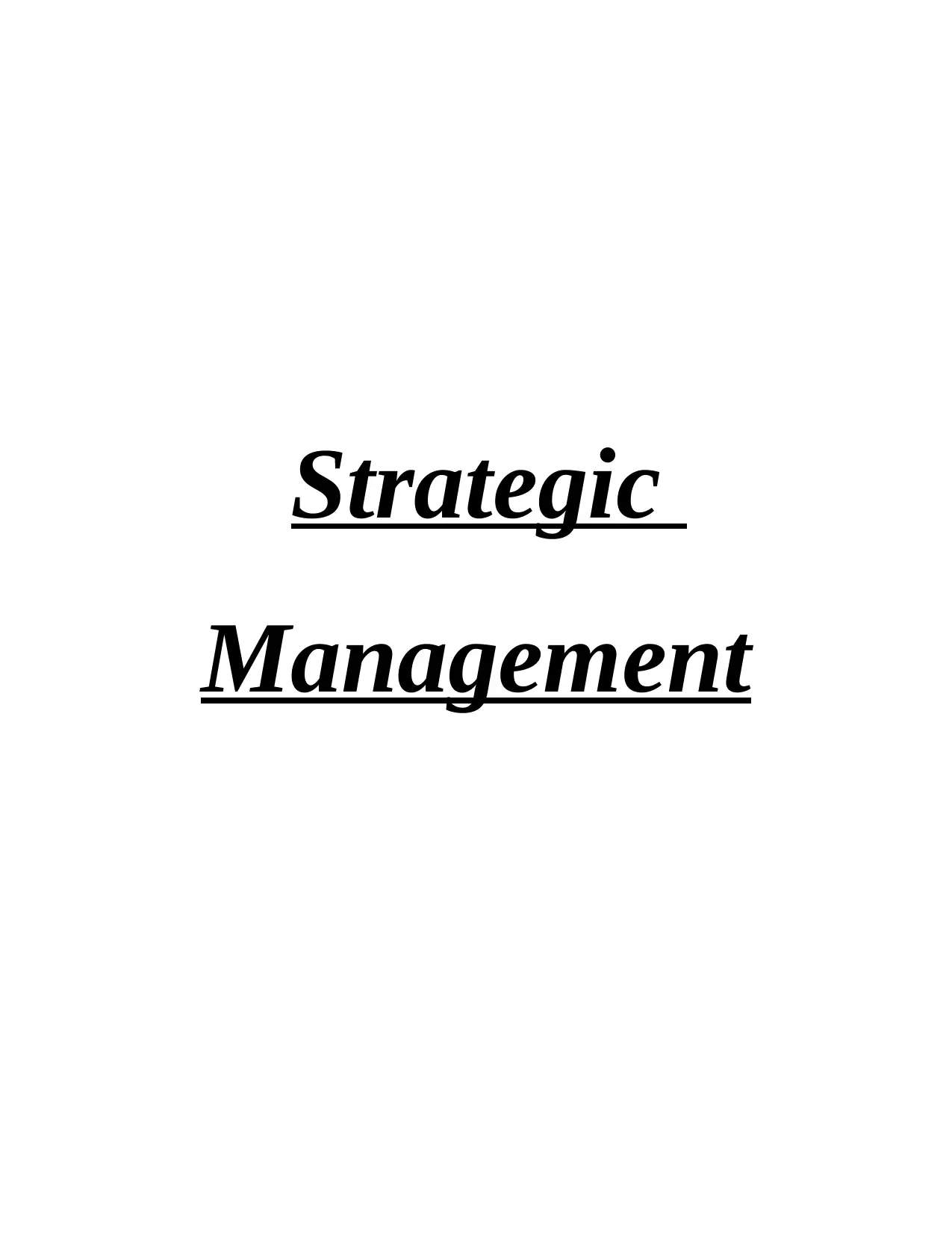
Strategic
Management
Management
Paraphrase This Document
Need a fresh take? Get an instant paraphrase of this document with our AI Paraphraser
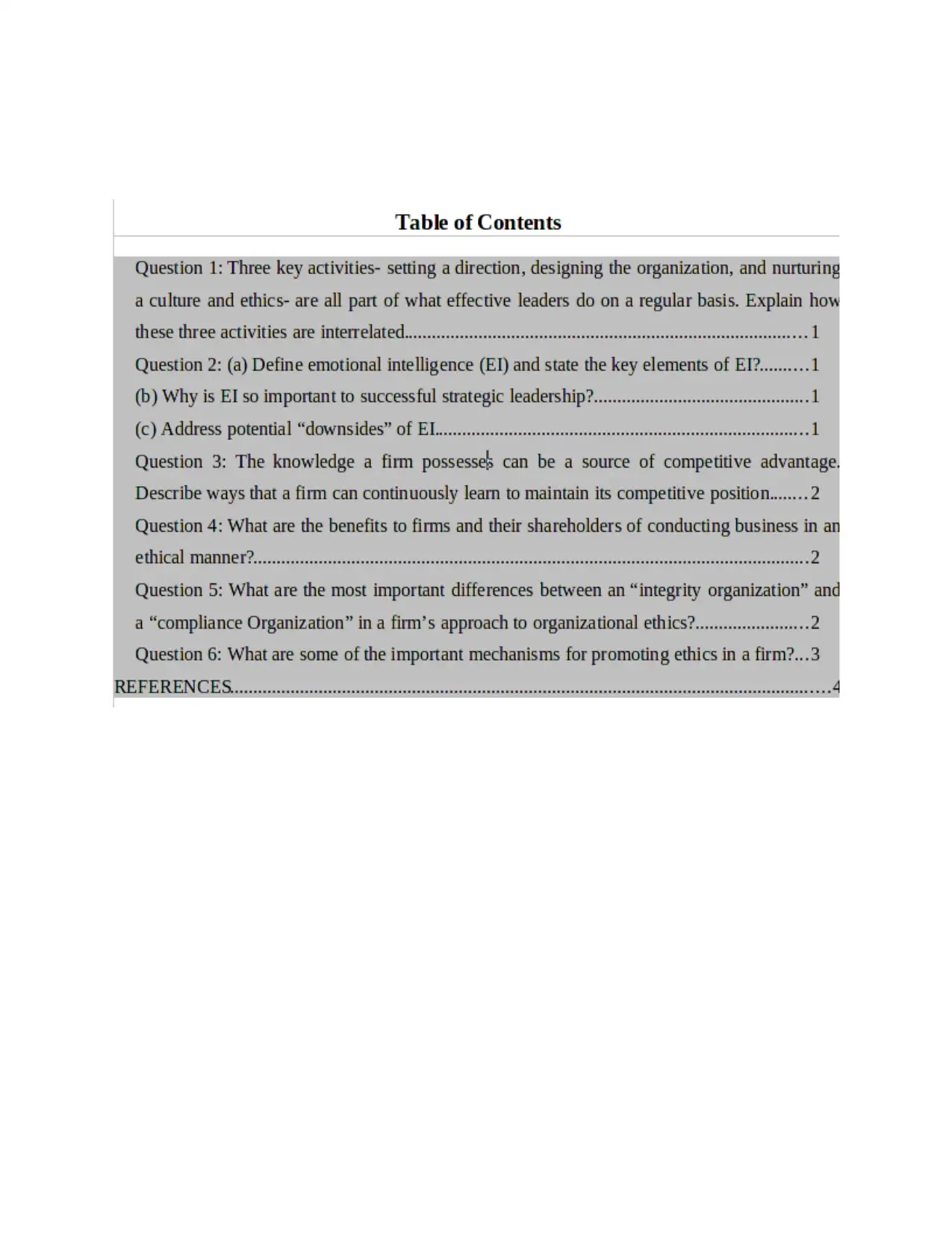
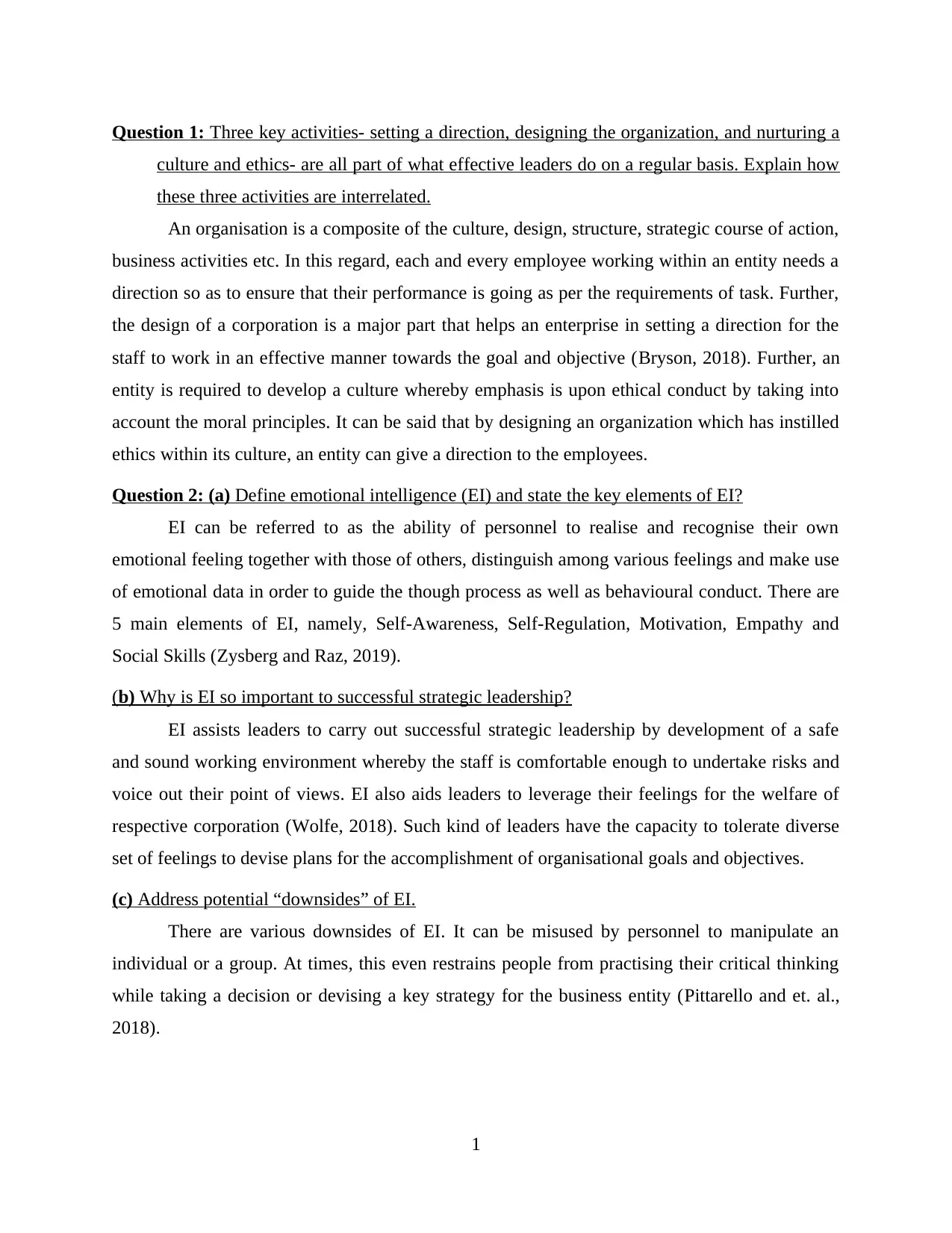
Question 1: Three key activities- setting a direction, designing the organization, and nurturing a
culture and ethics- are all part of what effective leaders do on a regular basis. Explain how
these three activities are interrelated.
An organisation is a composite of the culture, design, structure, strategic course of action,
business activities etc. In this regard, each and every employee working within an entity needs a
direction so as to ensure that their performance is going as per the requirements of task. Further,
the design of a corporation is a major part that helps an enterprise in setting a direction for the
staff to work in an effective manner towards the goal and objective (Bryson, 2018). Further, an
entity is required to develop a culture whereby emphasis is upon ethical conduct by taking into
account the moral principles. It can be said that by designing an organization which has instilled
ethics within its culture, an entity can give a direction to the employees.
Question 2: (a) Define emotional intelligence (EI) and state the key elements of EI?
EI can be referred to as the ability of personnel to realise and recognise their own
emotional feeling together with those of others, distinguish among various feelings and make use
of emotional data in order to guide the though process as well as behavioural conduct. There are
5 main elements of EI, namely, Self-Awareness, Self-Regulation, Motivation, Empathy and
Social Skills (Zysberg and Raz, 2019).
(b) Why is EI so important to successful strategic leadership?
EI assists leaders to carry out successful strategic leadership by development of a safe
and sound working environment whereby the staff is comfortable enough to undertake risks and
voice out their point of views. EI also aids leaders to leverage their feelings for the welfare of
respective corporation (Wolfe, 2018). Such kind of leaders have the capacity to tolerate diverse
set of feelings to devise plans for the accomplishment of organisational goals and objectives.
(c) Address potential “downsides” of EI.
There are various downsides of EI. It can be misused by personnel to manipulate an
individual or a group. At times, this even restrains people from practising their critical thinking
while taking a decision or devising a key strategy for the business entity (Pittarello and et. al.,
2018).
1
culture and ethics- are all part of what effective leaders do on a regular basis. Explain how
these three activities are interrelated.
An organisation is a composite of the culture, design, structure, strategic course of action,
business activities etc. In this regard, each and every employee working within an entity needs a
direction so as to ensure that their performance is going as per the requirements of task. Further,
the design of a corporation is a major part that helps an enterprise in setting a direction for the
staff to work in an effective manner towards the goal and objective (Bryson, 2018). Further, an
entity is required to develop a culture whereby emphasis is upon ethical conduct by taking into
account the moral principles. It can be said that by designing an organization which has instilled
ethics within its culture, an entity can give a direction to the employees.
Question 2: (a) Define emotional intelligence (EI) and state the key elements of EI?
EI can be referred to as the ability of personnel to realise and recognise their own
emotional feeling together with those of others, distinguish among various feelings and make use
of emotional data in order to guide the though process as well as behavioural conduct. There are
5 main elements of EI, namely, Self-Awareness, Self-Regulation, Motivation, Empathy and
Social Skills (Zysberg and Raz, 2019).
(b) Why is EI so important to successful strategic leadership?
EI assists leaders to carry out successful strategic leadership by development of a safe
and sound working environment whereby the staff is comfortable enough to undertake risks and
voice out their point of views. EI also aids leaders to leverage their feelings for the welfare of
respective corporation (Wolfe, 2018). Such kind of leaders have the capacity to tolerate diverse
set of feelings to devise plans for the accomplishment of organisational goals and objectives.
(c) Address potential “downsides” of EI.
There are various downsides of EI. It can be misused by personnel to manipulate an
individual or a group. At times, this even restrains people from practising their critical thinking
while taking a decision or devising a key strategy for the business entity (Pittarello and et. al.,
2018).
1
⊘ This is a preview!⊘
Do you want full access?
Subscribe today to unlock all pages.

Trusted by 1+ million students worldwide
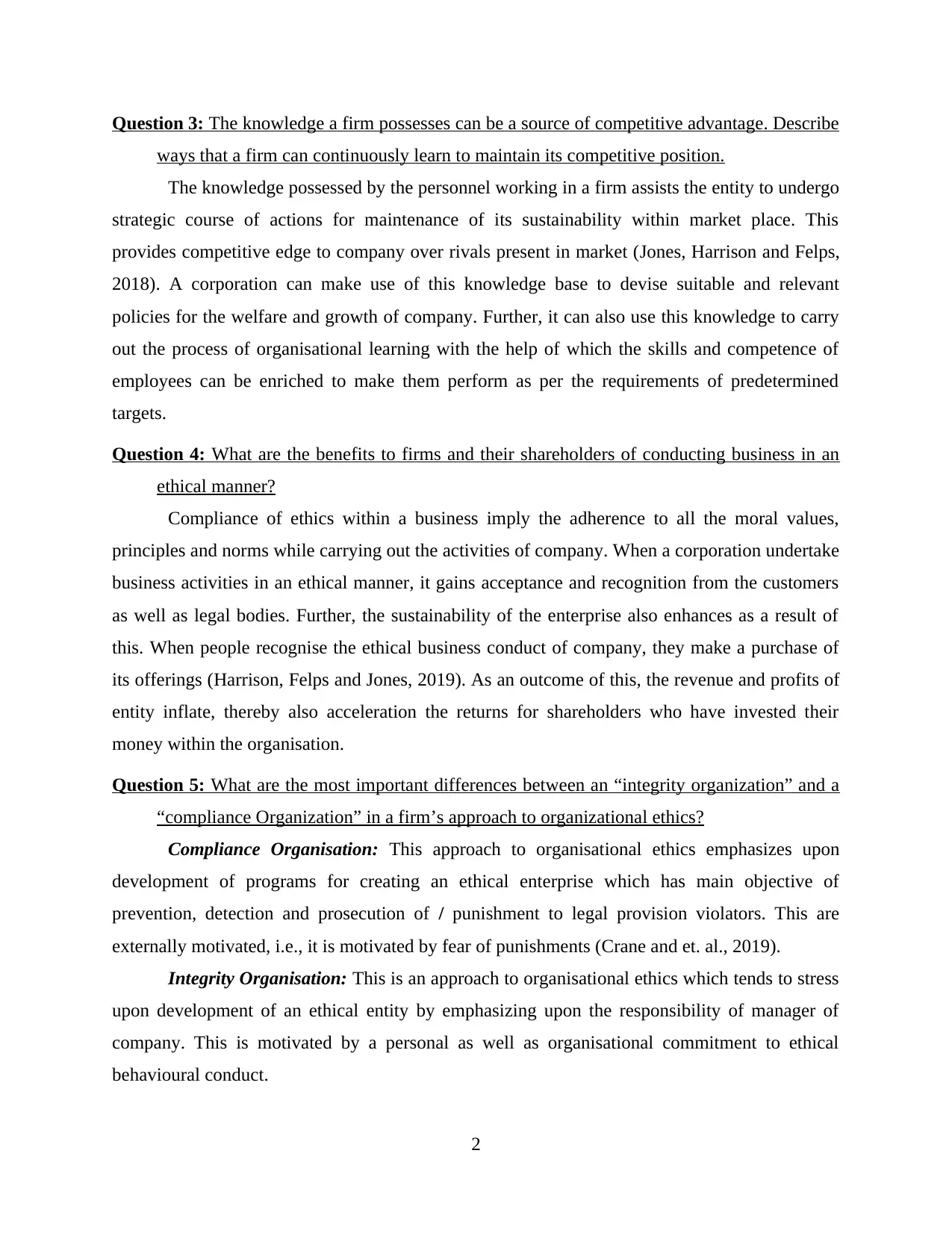
Question 3: The knowledge a firm possesses can be a source of competitive advantage. Describe
ways that a firm can continuously learn to maintain its competitive position.
The knowledge possessed by the personnel working in a firm assists the entity to undergo
strategic course of actions for maintenance of its sustainability within market place. This
provides competitive edge to company over rivals present in market (Jones, Harrison and Felps,
2018). A corporation can make use of this knowledge base to devise suitable and relevant
policies for the welfare and growth of company. Further, it can also use this knowledge to carry
out the process of organisational learning with the help of which the skills and competence of
employees can be enriched to make them perform as per the requirements of predetermined
targets.
Question 4: What are the benefits to firms and their shareholders of conducting business in an
ethical manner?
Compliance of ethics within a business imply the adherence to all the moral values,
principles and norms while carrying out the activities of company. When a corporation undertake
business activities in an ethical manner, it gains acceptance and recognition from the customers
as well as legal bodies. Further, the sustainability of the enterprise also enhances as a result of
this. When people recognise the ethical business conduct of company, they make a purchase of
its offerings (Harrison, Felps and Jones, 2019). As an outcome of this, the revenue and profits of
entity inflate, thereby also acceleration the returns for shareholders who have invested their
money within the organisation.
Question 5: What are the most important differences between an “integrity organization” and a
“compliance Organization” in a firm’s approach to organizational ethics?
Compliance Organisation: This approach to organisational ethics emphasizes upon
development of programs for creating an ethical enterprise which has main objective of
prevention, detection and prosecution of / punishment to legal provision violators. This are
externally motivated, i.e., it is motivated by fear of punishments (Crane and et. al., 2019).
Integrity Organisation: This is an approach to organisational ethics which tends to stress
upon development of an ethical entity by emphasizing upon the responsibility of manager of
company. This is motivated by a personal as well as organisational commitment to ethical
behavioural conduct.
2
ways that a firm can continuously learn to maintain its competitive position.
The knowledge possessed by the personnel working in a firm assists the entity to undergo
strategic course of actions for maintenance of its sustainability within market place. This
provides competitive edge to company over rivals present in market (Jones, Harrison and Felps,
2018). A corporation can make use of this knowledge base to devise suitable and relevant
policies for the welfare and growth of company. Further, it can also use this knowledge to carry
out the process of organisational learning with the help of which the skills and competence of
employees can be enriched to make them perform as per the requirements of predetermined
targets.
Question 4: What are the benefits to firms and their shareholders of conducting business in an
ethical manner?
Compliance of ethics within a business imply the adherence to all the moral values,
principles and norms while carrying out the activities of company. When a corporation undertake
business activities in an ethical manner, it gains acceptance and recognition from the customers
as well as legal bodies. Further, the sustainability of the enterprise also enhances as a result of
this. When people recognise the ethical business conduct of company, they make a purchase of
its offerings (Harrison, Felps and Jones, 2019). As an outcome of this, the revenue and profits of
entity inflate, thereby also acceleration the returns for shareholders who have invested their
money within the organisation.
Question 5: What are the most important differences between an “integrity organization” and a
“compliance Organization” in a firm’s approach to organizational ethics?
Compliance Organisation: This approach to organisational ethics emphasizes upon
development of programs for creating an ethical enterprise which has main objective of
prevention, detection and prosecution of / punishment to legal provision violators. This are
externally motivated, i.e., it is motivated by fear of punishments (Crane and et. al., 2019).
Integrity Organisation: This is an approach to organisational ethics which tends to stress
upon development of an ethical entity by emphasizing upon the responsibility of manager of
company. This is motivated by a personal as well as organisational commitment to ethical
behavioural conduct.
2
Paraphrase This Document
Need a fresh take? Get an instant paraphrase of this document with our AI Paraphraser
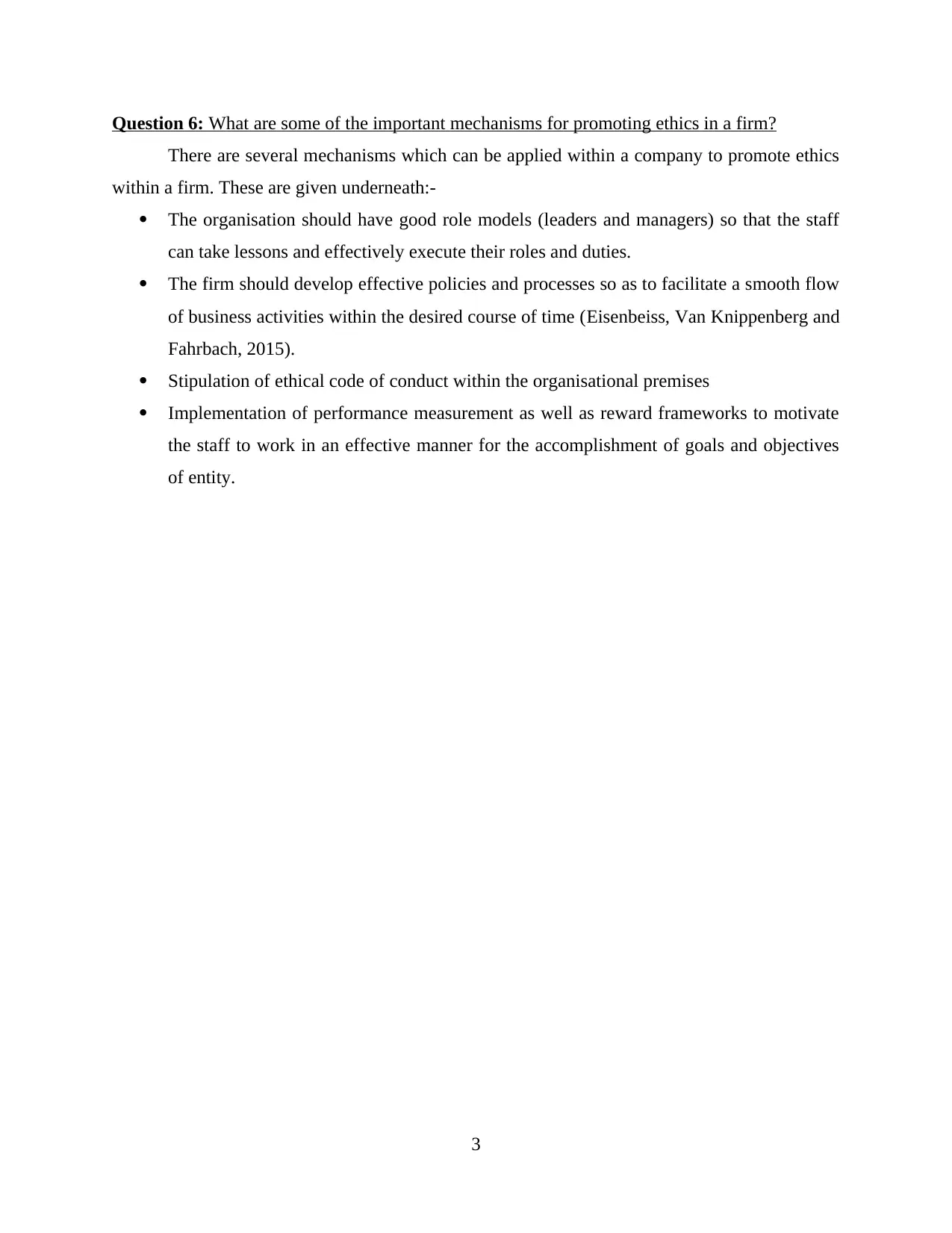
Question 6: What are some of the important mechanisms for promoting ethics in a firm?
There are several mechanisms which can be applied within a company to promote ethics
within a firm. These are given underneath:-
The organisation should have good role models (leaders and managers) so that the staff
can take lessons and effectively execute their roles and duties.
The firm should develop effective policies and processes so as to facilitate a smooth flow
of business activities within the desired course of time (Eisenbeiss, Van Knippenberg and
Fahrbach, 2015).
Stipulation of ethical code of conduct within the organisational premises
Implementation of performance measurement as well as reward frameworks to motivate
the staff to work in an effective manner for the accomplishment of goals and objectives
of entity.
3
There are several mechanisms which can be applied within a company to promote ethics
within a firm. These are given underneath:-
The organisation should have good role models (leaders and managers) so that the staff
can take lessons and effectively execute their roles and duties.
The firm should develop effective policies and processes so as to facilitate a smooth flow
of business activities within the desired course of time (Eisenbeiss, Van Knippenberg and
Fahrbach, 2015).
Stipulation of ethical code of conduct within the organisational premises
Implementation of performance measurement as well as reward frameworks to motivate
the staff to work in an effective manner for the accomplishment of goals and objectives
of entity.
3
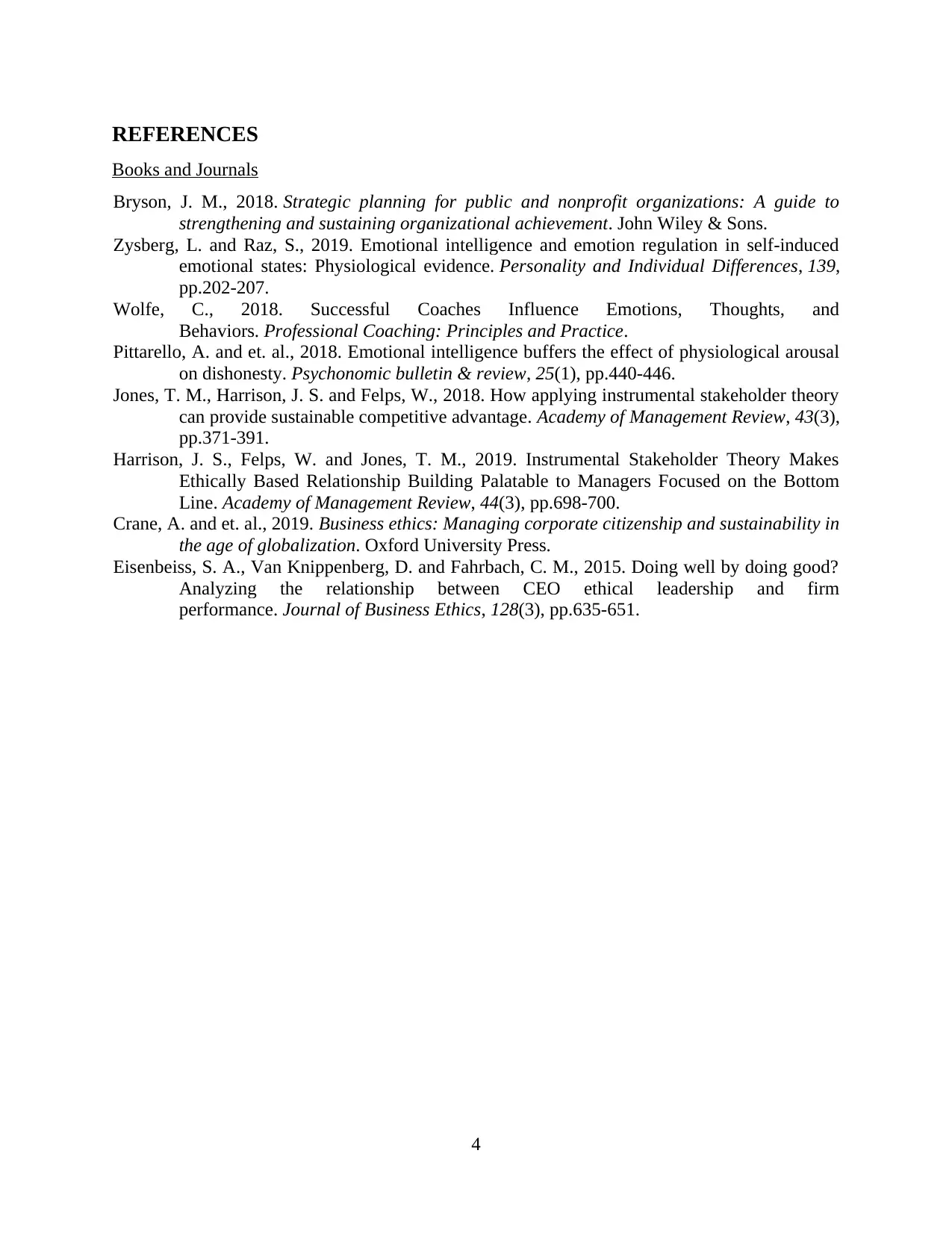
REFERENCES
Books and Journals
Bryson, J. M., 2018. Strategic planning for public and nonprofit organizations: A guide to
strengthening and sustaining organizational achievement. John Wiley & Sons.
Zysberg, L. and Raz, S., 2019. Emotional intelligence and emotion regulation in self-induced
emotional states: Physiological evidence. Personality and Individual Differences, 139,
pp.202-207.
Wolfe, C., 2018. Successful Coaches Influence Emotions, Thoughts, and
Behaviors. Professional Coaching: Principles and Practice.
Pittarello, A. and et. al., 2018. Emotional intelligence buffers the effect of physiological arousal
on dishonesty. Psychonomic bulletin & review, 25(1), pp.440-446.
Jones, T. M., Harrison, J. S. and Felps, W., 2018. How applying instrumental stakeholder theory
can provide sustainable competitive advantage. Academy of Management Review, 43(3),
pp.371-391.
Harrison, J. S., Felps, W. and Jones, T. M., 2019. Instrumental Stakeholder Theory Makes
Ethically Based Relationship Building Palatable to Managers Focused on the Bottom
Line. Academy of Management Review, 44(3), pp.698-700.
Crane, A. and et. al., 2019. Business ethics: Managing corporate citizenship and sustainability in
the age of globalization. Oxford University Press.
Eisenbeiss, S. A., Van Knippenberg, D. and Fahrbach, C. M., 2015. Doing well by doing good?
Analyzing the relationship between CEO ethical leadership and firm
performance. Journal of Business Ethics, 128(3), pp.635-651.
4
Books and Journals
Bryson, J. M., 2018. Strategic planning for public and nonprofit organizations: A guide to
strengthening and sustaining organizational achievement. John Wiley & Sons.
Zysberg, L. and Raz, S., 2019. Emotional intelligence and emotion regulation in self-induced
emotional states: Physiological evidence. Personality and Individual Differences, 139,
pp.202-207.
Wolfe, C., 2018. Successful Coaches Influence Emotions, Thoughts, and
Behaviors. Professional Coaching: Principles and Practice.
Pittarello, A. and et. al., 2018. Emotional intelligence buffers the effect of physiological arousal
on dishonesty. Psychonomic bulletin & review, 25(1), pp.440-446.
Jones, T. M., Harrison, J. S. and Felps, W., 2018. How applying instrumental stakeholder theory
can provide sustainable competitive advantage. Academy of Management Review, 43(3),
pp.371-391.
Harrison, J. S., Felps, W. and Jones, T. M., 2019. Instrumental Stakeholder Theory Makes
Ethically Based Relationship Building Palatable to Managers Focused on the Bottom
Line. Academy of Management Review, 44(3), pp.698-700.
Crane, A. and et. al., 2019. Business ethics: Managing corporate citizenship and sustainability in
the age of globalization. Oxford University Press.
Eisenbeiss, S. A., Van Knippenberg, D. and Fahrbach, C. M., 2015. Doing well by doing good?
Analyzing the relationship between CEO ethical leadership and firm
performance. Journal of Business Ethics, 128(3), pp.635-651.
4
⊘ This is a preview!⊘
Do you want full access?
Subscribe today to unlock all pages.

Trusted by 1+ million students worldwide
1 out of 6
Related Documents
Your All-in-One AI-Powered Toolkit for Academic Success.
+13062052269
info@desklib.com
Available 24*7 on WhatsApp / Email
![[object Object]](/_next/static/media/star-bottom.7253800d.svg)
Unlock your academic potential
Copyright © 2020–2026 A2Z Services. All Rights Reserved. Developed and managed by ZUCOL.





